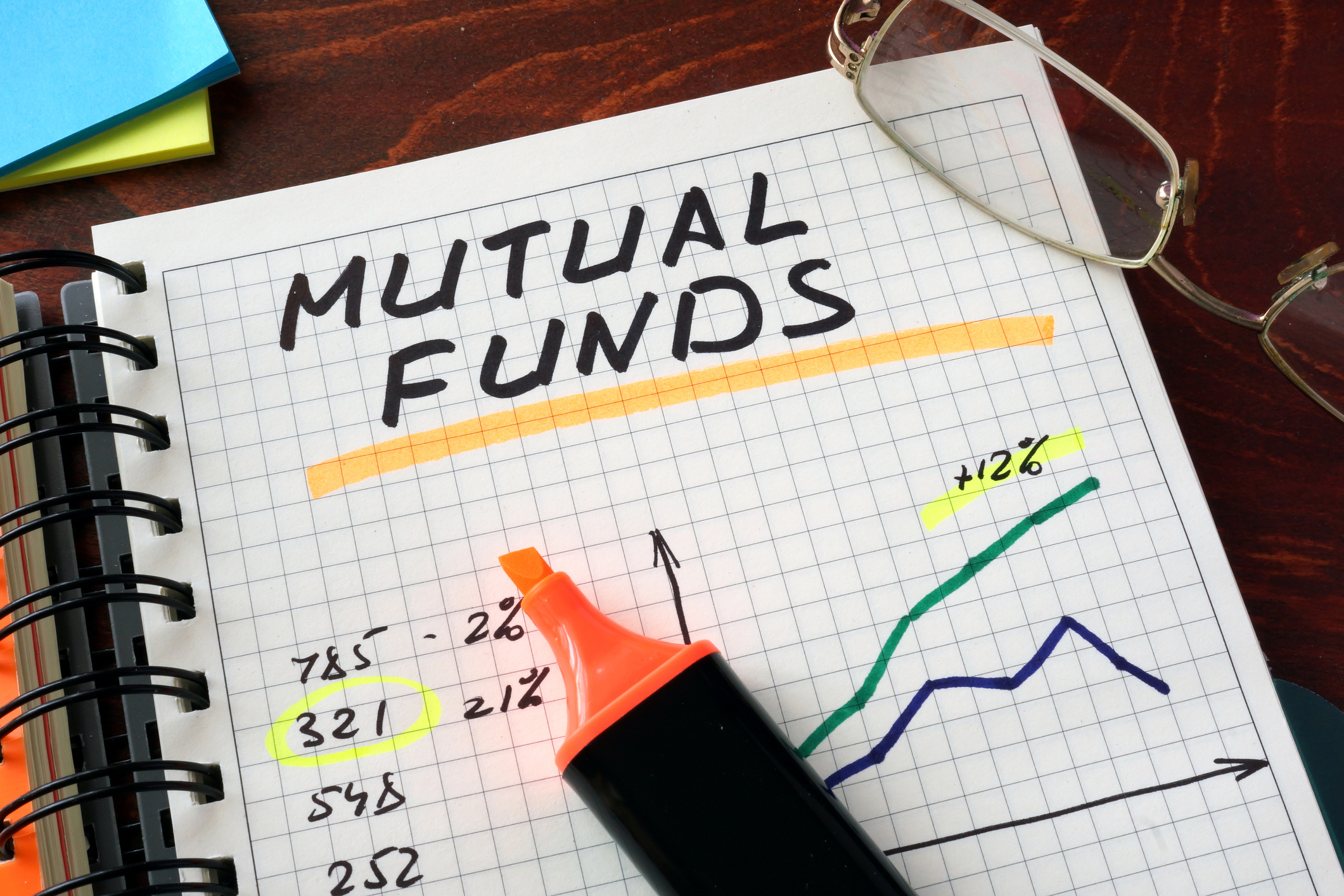Mutual funds are pooled investment vehicles that collect money from many investors and invest it in a diversified portfolio of stocks, bonds, or other assets.
Despite the rise of exchange-traded funds (ETFs), mutual funds remain a staple investment option. These funds continue to play a key role in retirement planning, particularly in workplace plans such as 401(k)s, where they remain a cornerstone of long-term investing.
Mutual funds run the gamut from tracking stock market indexes to following specific sectors, such as real estate, technology, or even cryptocurrency.
However, like any other investment product, there are both good and bad mutual funds. Understanding how they work, how to invest in them, their advantages, and potential drawbacks is essential for investors looking to make informed financial decisions.

How do mutual funds work?
Mutual funds pool money from many investors and use that capital to buy a diversified portfolio of stocks, bonds, or other securities.
When you invest, you are buying units of the fund rather than individual assets. Each unit is priced based on the fund’s net asset value (NAV), which represents the total value of all underlying holdings divided by the number of units outstanding.
Unlike ETFs, which trade throughout the day, mutual fund transactions settle once per day after the market closes, when the NAV is calculated. Buy and sell orders submitted during the day are all executed at that end-of-day NAV.
Mutual funds operate under strict regulatory frameworks, which in the U.S. is primarily the Investment Company Act of 1940. This governs liquidity rules, diversification requirements, disclosure, and how funds must treat unitholders.
For investors, this means the experience is straightforward: you invest through a brokerage or directly with the fund company, you receive periodic distributions, and the fund company handles all trading, rebalancing, and administrative work on your behalf.
Six top mutual funds for 2025
With thousands of mutual funds on the market, narrowing down the best options can be overwhelming. To help, we've selected six top mutual funds for 2025 based on key factors that make them attractive for long-term investors. Each fund on this list has been chosen for its low investment minimums, low expense ratios, long track record, high diversification, and strong historical performance.
1. Fidelity 500 Index Fund (FXAIX)

NASDAQMUTFUND: FXAIX
Key Data Points
The Fidelity 500 Index Fund (FXAIX +0.41%) is one of the best low-cost mutual funds for broad market exposure. Launched in 1988, this fund tracks the S&P 500 index, offering investors a simple, diversified way to invest in America's largest companies.
One of this fund's biggest advantages is its extremely low expense ratio of just 0.015%, making it one of the cheapest index funds available. It also has no minimum investment requirement, allowing investors of all levels to participate.
Another reason to like this Fidelity fund is its tax efficiency, thanks to its low 2% turnover rate, which means it rarely buys and sells stocks, which helps to reduce taxable capital gains distributions. Over the last 10 years, the fund has delivered an annualized return of 14.62%.
2. Fidelity Total Market Index Fund (FSKAX)

NASDAQMUTFUND: FSKAX
Key Data Points
The Fidelity Total Market Index Fund (FSKAX +0.38%) is a low-cost, highly diversified index fund designed to give investors exposure to the entire U.S. stock market. Launched in 1997, this fund tracks the Dow Jones U.S. Total Stock Market Index, making it a broader alternative to S&P 500-only funds.
Like the Fidelity 500 Index Fund, this Fidelity fund comes with a rock-bottom expense ratio of just 0.015% and has no minimum investment requirement, making it accessible to all investors. It's also tax-efficient, with a low 2% turnover rate, helping to minimize taxable capital gains distributions.
The key difference between this fund and the Fidelity S&P 500 fund is that this total market fund includes thousands of mid- and small-cap stocks, providing broader diversification beyond the largest U.S. companies. Despite this broader exposure, it has still delivered a strong 10-year annualized return of 14.04%.
3. Schwab 1000 Index Fund (SNXFX)

NASDAQMUTFUND: SNXFX
Key Data Points
The Schwab 1000 Index Fund (SNXFX +0.34%) is a straightforward, low-cost mutual fund that provides exposure to the 1,000 largest U.S. stocks, weighted by market capitalization. With coverage of roughly 90% of the total U.S. stock market, this Schwab fund provides broader diversification than S&P 500-only funds while maintaining the stability of larger, well-established companies.
The fund is also tax-efficient, with a 3.14% turnover rate, meaning minimal capital gains distributions. It comes with a low expense ratio of 0.05% and no minimum investment requirements, making it an affordable option. Over the last 10 years, this mutual fund has delivered a 14.22% annualized return.
4. Vanguard Total International Stock Index Fund Admiral Shares (VTIAX)

NASDAQMUTFUND: VTIAX
Key Data Points
For low-cost international diversification, the Vanguard Total International Stock Index Fund Admiral Shares (VTIAX +1.52%) is one of the best options available. This mutual fund tracks the FTSE Global All Cap ex US Index, covering more than 8,500 stocks from both developed and emerging markets.
Like many Vanguard index funds, this one is fairly tax-efficient, with a 3.4% turnover rate, reducing capital gains distributions. It requires a $3,000 minimum investment, which may be an issue for smaller investors. However, it charges a reasonably low 0.09% expense ratio.
Over the last 10 years, this Vanguard fund has delivered a 7.83% annualized return -- a lower figure compared to U.S. stocks, as international markets have historically lagged. Still, for those looking to balance their portfolio with global exposure, this fund remains a strong long-term option.
5. Vanguard Total World Stock Index Fund Admiral Shares (VTWAX)

NASDAQMUTFUND: VTWAX
Key Data Points
For investors looking for one fund that covers the entire global stock market, the Vanguard Total World Stock Index Fund Admiral Shares (VTWAX +0.81%) is an excellent choice. It tracks the FTSE Global All Cap Index, providing exposure to more than 9,800 stocks in the U.S., developed, and emerging markets, as well as overseas, all in a single package.
Like many passive index funds, this Vanguard fund is designed to be tax-efficient, with a low 2.8% turnover rate, which helps minimize taxable distributions. The expense ratio of just 0.09% also keeps costs low, making it one of the most affordable global stock funds available.
Over the past five years, this index fund has delivered an annualized return of 14.47%, benefiting from strong U.S. market performance while still providing broad international diversification. However, like most Vanguard Admiral Shares funds, it requires a $3,000 minimum investment, which may be a barrier for some investors.
6. Vanguard Wellington Fund Investor Shares (VWELX)

NASDAQMUTFUND: VWELX
Key Data Points
The Vanguard Wellington Fund Investor Shares (VWELX +0.35%) is one of the most resilient, time-tested mutual funds available. Launched in 1929, it has navigated almost a century of market cycles, delivering an 8.41% annualized return since inception.
This fund has survived and thrived through major financial crises, including the Great Depression, Black Monday in 1987, the dot-com bubble, the Great Recession, and the COVID-19 market crash.
Unlike traditional index funds, this Vanguard fund is actively managed and does not track a benchmark. Instead, it holds a carefully selected portfolio, with two-thirds comprising high-quality dividend-paying stocks screened for value and stability and one-third made up of investment-grade bonds, providing a balance of growth and income.
This allocation helps the fund weather market downturns better than pure stock funds, making it a strong choice for investors seeking lower volatility without sacrificing returns.
That said, this mutual fund isn't the most tax-efficient option due to its mix of stocks and bonds, which can generate taxable distributions. And although its 0.25% expense ratio is reasonable for an actively managed fund, it's higher than that of low-cost index funds.
Types of mutual funds
- Equity (stock) funds: Invest primarily in stocks with the goal of long-term growth. These carry higher risk but also higher return potential.
- Bond (debt) funds: Focus on government, corporate, or municipal bonds. They aim to generate steady income with lower volatility than stock funds.
- Balanced (hybrid) funds: Combine stocks and bonds in one portfolio to offer both growth and stability.
- Money market funds: Invest in short-term, high-quality debt instruments. These aim to preserve capital with a fixed NAV per share of $1 and provide modest, low-risk returns.
- Alternative funds: Use non-traditional strategies or invest in assets like commodities, real estate, or hedge fund-style approaches to diversify beyond stocks and bonds.
Should I invest in mutual funds?
Whether you should invest in mutual funds depends on the options available to you. If you're investing through a 401(k) plan, mutual funds might be your only choice since many employer-sponsored plans don't offer ETFs. In that case, mutual funds can still be a solid option for building long-term wealth.
If you're investing in a self-directed brokerage account, there's usually no compelling reason to choose mutual funds over ETFs, unless there's a specific strategy that appeals to you or you find a fund with ultra-low fees, like Fidelity's zero-cost index funds.
Factors to consider when investing in mutual funds
When evaluating mutual funds, it’s important to focus on the factors that can quietly reduce your long-term returns.
The biggest drag tends to come from fees. Every mutual fund charges an expense ratio, which covers management, operations, and administrative costs.
Some funds may also include sales loads, which are commissions paid when you buy or sell units, or 12b-1 fees, which are marketing and distribution fees built into the fund’s ongoing expenses. These charges vary widely, so it’s best to avoid funds with front-end or back-end loads and prioritize those with lower ongoing fees.
Another consideration is how actively a fund trades. Actively managed mutual funds can outperform the market, but many have high turnover, meaning the manager frequently buys and sells holdings.
High turnover generates more taxable capital gains distributions, typically paid out in December. For investors holding mutual funds in taxable accounts, these distributions can create an unnecessary tax bill, even if you didn’t sell any units yourself.
Related investing topics
Potential benefits of mutual funds:
- Access to professional portfolio management without the need to pick individual securities
- Built-in diversification, spreading risk across many holdings in one fund
- Automatic dividend reinvestment to compound returns over time
- Lower trading costs for long-term investors, since there's no need for frequent buying or selling
- Wide range of investment strategies, from conservative bond funds to aggressive stock funds
Potential risks of mutual funds:
- Higher expense ratios compared to ETFs, which can erode returns over time
- Less tax efficiency because capital gains are distributed annually, even if you didn't sell shares
- Limited trading flexibility since mutual funds are priced only once per day after markets close
In most cases, ETFs provide similar market exposure with added benefits, including intraday trading flexibility, lower expense ratios, and better tax efficiency. For investors who prioritize cost and flexibility, ETFs are often the better choice.
